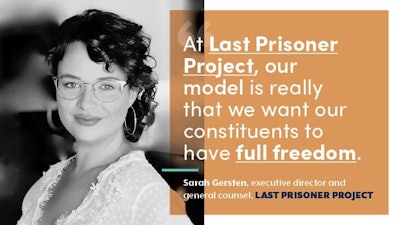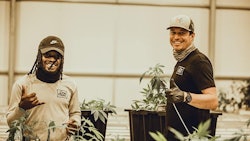
This is part one of a two-part interview. Part two will be published next week.
Last Prisoner Project (LPP), the nonprofit group dedicated to helping ensure the freedom of all 40,000 cannabis prisoners in the U.S., as well as inmates serving cannabis sentences around the world, is one year old.
Cannabis Business Times and Cannabis Dispensary recently spoke with Sarah Gersten, executive director and general counsel LPP, about some of the facts and statistics that drive the organization’s work and how it has navigated an eventful year.
Patrick Williams: The Last Prisoner Project just sent out its “Year One at a Glance” report, which highlights the work that the organization has been doing over the past year. It explains how, among other things, LPP and the law firm Goodwin successfully secured the compassionate release of Philong Chuong. Who is Philong, and what are the next steps for him?
Sarah Gersten: Philong is a 57-year-old father of two. He actually came here as a refugee during the Vietnam War. And he really was an incredible father, really a benefit to his community. He was living in Oakland, California, and all of his friends, family members, neighbors, had really positive things to say about him. But unfortunately, he was sentenced to 87 months in federal prison in 2015 for a nonviolent marijuana offense.
So, at this point in 2020, he's been incarcerated for five years. … He's, like anyone that's incarcerated now during this pandemic, really at risk of contracting COVID, and because of his age, it [could be] really serious for him, Philong's release efforts are part of a broader effort that Last Prisoner Project, along with Goodwin and a few other law firms initiated bonds to COVID. This is really a pivot for us this year. To date, our release efforts had been focused on securing release through executive clemency, and with COVID, we really saw an opportunity to grant compassionate release, particularly for individuals like Philong, who either were older or had preexisting conditions. So, over the summer, he was part of several compassionate-release motions we filed, and he was actually the first [judicial] opinion either way that we got [on compassionate release]. And And obviously his compassionate release motion was granted. Last month, he was released and returned home to his family.
RELATED: Last Prisoner Project Works to End Cannabis Incarceration
PW: The “Year One at a Glance” report highlights that on the reentry side, LPP assisted Stephanie Shepard, who was convicted of conspiracy to distribute, and Nehemiah Cole, who was convicted of felony possession. Through the program, they have been able to do things like obtain a scholarship to Oaksterdam University in Stephanie’s case, and complete food-safety and manufacturing certification courses through SCS Global Services in Nehemiah’s case. Could you talk about the importance of reentry as a pillar of LPP’s work and some of the things that go into it?
SG: At Last Prisoner Project, our model is really that we want our constituents to have full freedom. Obviously the first step on that journey is being released from incarceration. But after that, the second piece is really working to remove barriers to reentry, so ensuring that our constituents have a clean slate. Then that third pillar is reentry—working with our constituents to ensure that they have the resources and the support that they need to fully reenter. We know that when someone is coming out of incarceration, unfortunately they really don't get that support. In fact, our society and the legal system sets up tens of thousands of barriers when you look at all of the barriers that come with having a criminal record and being on probation or parole. We see that in the data.
We know that the recidivism rate in this country just shows that we really are not setting up individuals coming out of incarceration for success. [Within] three years of release, over two thirds of formerly incarcerated people will be rearrested. And within six years, it's [nearly] 80%. The recidivism rate in America is just staggeringly high. That in and of itself speaks to A, the barriers, but B, the lack of support.
I've certainly seen this with my constituents. One of our constituents, Craig Cesal, who actually is released, but he's still on home confinement—I can't even tell you how difficult it's been for him to secure employment. Of course, there's so many restrictions on his travel, his freedom of movement, but being able to get housing, federal assistance—all of those things you're unable to access. That's the problem, which is why Last Prisoner Project really works to A, provide sort of those wraparound services that our constituents need to kind of meet their basic needs when they're coming out, but B, we really saw an opportunity within the industry to create pathways to employment for our constituents, especially, again, during COVID. For most people coming out, this is already very difficult, but you're coming out during a pandemic, you're coming out during really high rates of unemployment. The cannabis sector has been deemed an essential service in most jurisdictions, and I think now it's still operating in every state where we have fully recreational markets. So, this is actually a sector where there is a lot of opportunity.
At Last Prisoner Project, we are really lucky to partner with A, a lot of the companies that actually hire our constituents within the industry, but B, a lot of partners like you named, Oaksterdam, SCS Global, Green Flower, Academy of Cannabis Science, that are providing free scholarship opportunities to those educational services for our constituents so they can get a leg up in trying to secure those positions. So, that's something we've been doing, again, as part of our broader reentry efforts. A big piece of that is recruiting firms like Vangst that function specifically within cannabis and have partnered with us to ensure that they're offering employment opportunities to justice-impacted people. Actually, today and tomorrow, they are hosting their 2020 virtual job fair. (Editor's note: This interview was conducted October 21.) We have several of our reentry constituents that are participating in that. Our goal is definitely to come out of this job fair and have all of our constituents have [landing] employment in the industry.
This interview has been edited for length and clarity.


























